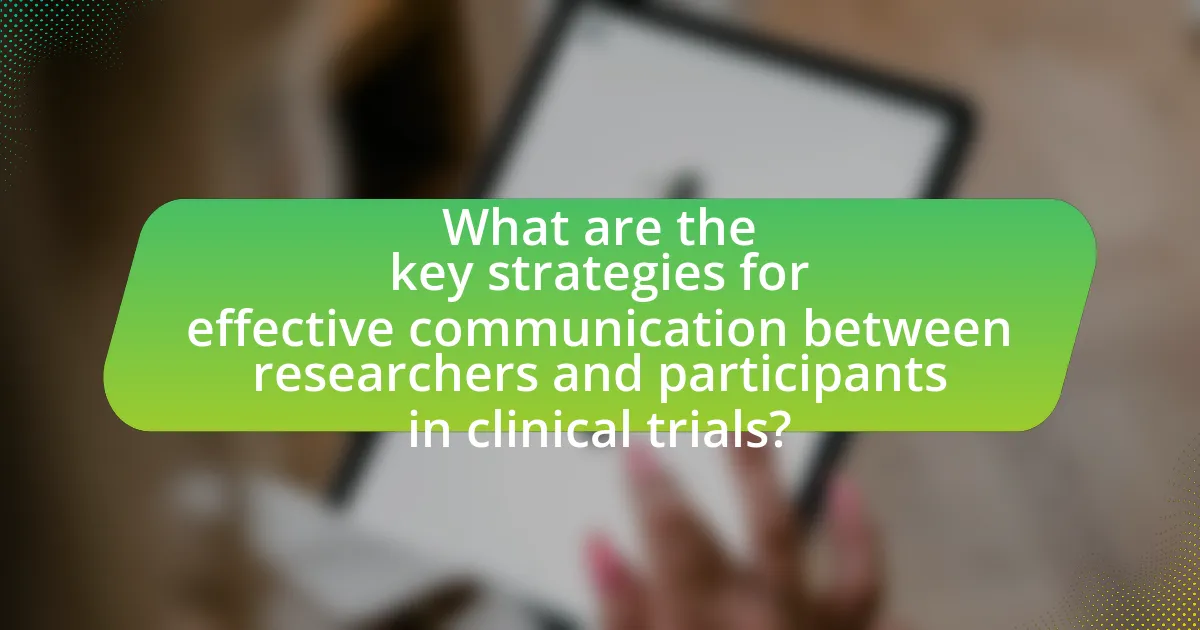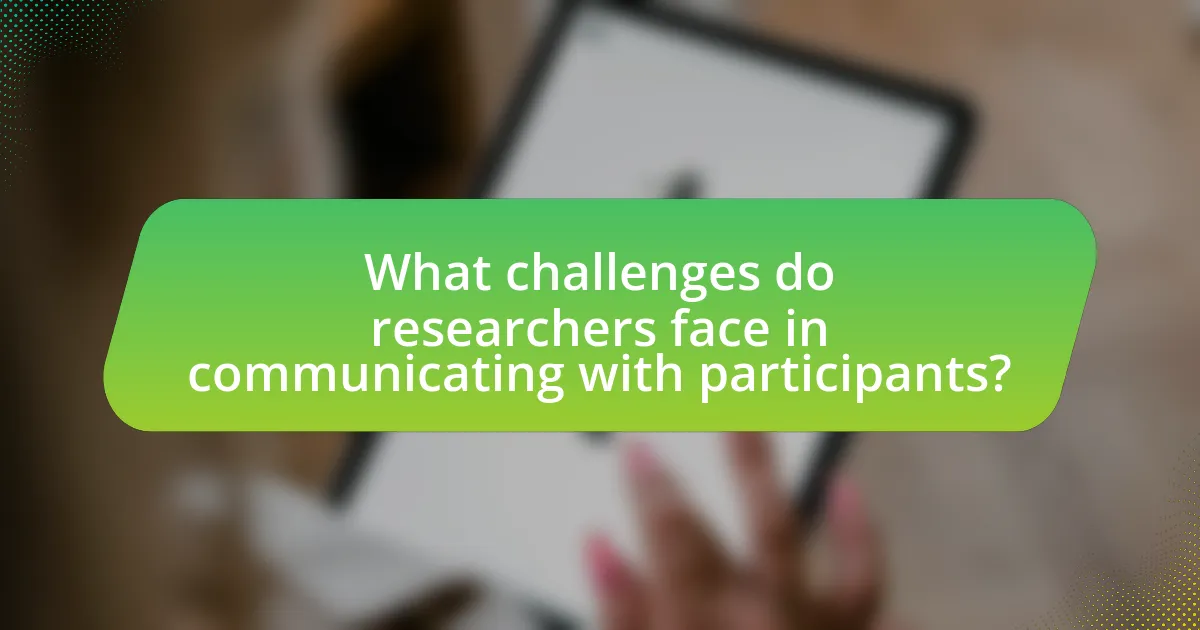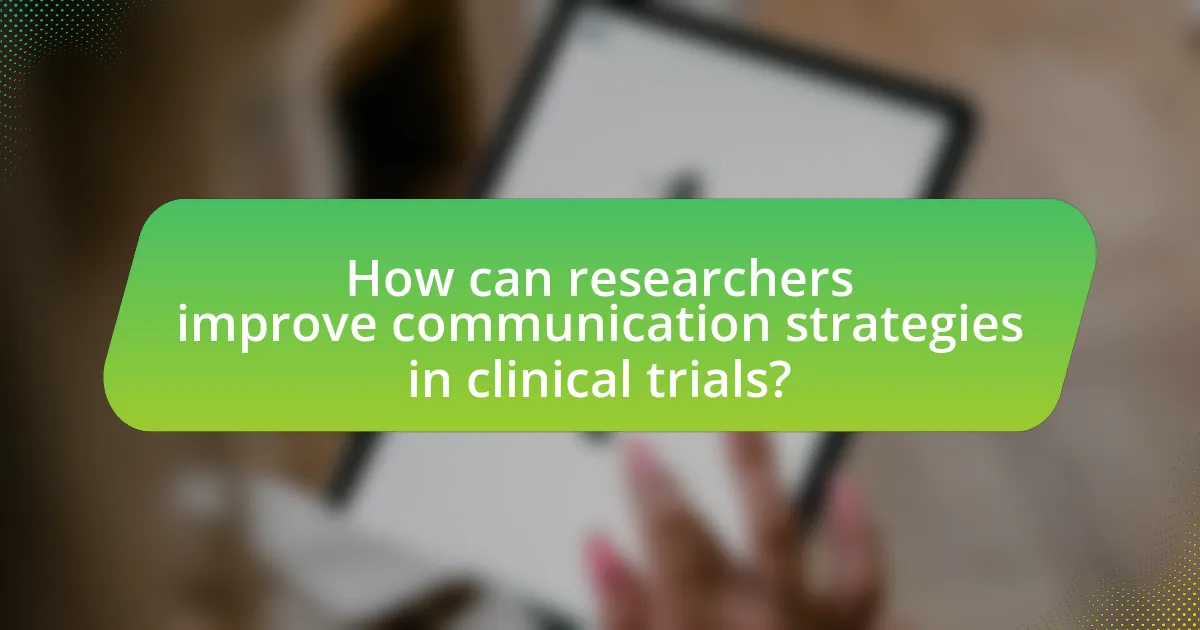The article focuses on strategies for effective communication between researchers and participants in clinical trials. It outlines key approaches such as establishing clear communication channels, providing comprehensive information, and ensuring ongoing engagement to enhance participant understanding and trust. The article emphasizes the importance of transparency in building trust, the effectiveness of various communication methods, and the role of participant feedback in improving trial outcomes. Additionally, it addresses challenges researchers face, including language barriers and cultural differences, while offering practical tips for enhancing communication strategies throughout the research process.

What are the key strategies for effective communication between researchers and participants in clinical trials?
Key strategies for effective communication between researchers and participants in clinical trials include establishing clear and transparent communication channels, providing comprehensive information about the trial, and ensuring ongoing engagement throughout the study. Clear communication channels, such as regular updates via email or dedicated platforms, facilitate participant inquiries and feedback. Comprehensive information, including the purpose, procedures, risks, and benefits of the trial, enhances participant understanding and trust. Ongoing engagement, through follow-up calls or meetings, fosters a supportive environment and encourages participant retention. These strategies are supported by research indicating that effective communication improves participant satisfaction and adherence, ultimately leading to more successful trial outcomes.
How can researchers establish trust with participants?
Researchers can establish trust with participants by ensuring transparency and maintaining open communication throughout the research process. Transparency involves clearly explaining the study’s purpose, procedures, risks, and benefits, which helps participants feel informed and valued. Open communication allows participants to ask questions and express concerns, fostering a supportive environment. Studies have shown that when researchers provide detailed information and are approachable, participants are more likely to trust them, leading to higher engagement and retention rates in clinical trials. For instance, a study published in the Journal of Medical Ethics highlighted that informed consent processes that prioritize participant understanding significantly enhance trust levels.
What role does transparency play in building trust?
Transparency is essential in building trust as it fosters open communication and accountability between researchers and participants in clinical trials. When researchers provide clear and honest information about the study’s purpose, procedures, risks, and benefits, participants feel more secure and valued, which enhances their willingness to engage. Studies show that transparency can lead to increased participant retention and satisfaction, as evidenced by a 2018 survey published in the Journal of Medical Ethics, which found that 85% of participants felt more trusting when researchers were forthcoming about trial details. This trust is crucial for the integrity of clinical research, as it encourages participant cooperation and adherence to study protocols.
How can researchers effectively share information about the trial?
Researchers can effectively share information about the trial by utilizing multiple communication channels, including digital platforms, printed materials, and in-person meetings. Digital platforms such as websites and social media allow for real-time updates and broader reach, while printed materials like brochures provide tangible information that participants can refer to. In-person meetings facilitate direct interaction, allowing researchers to address questions and concerns immediately. A study published in the Journal of Clinical Trials found that trials employing a combination of these methods reported higher participant engagement and satisfaction, demonstrating the effectiveness of diverse communication strategies.
What communication methods are most effective in clinical trials?
The most effective communication methods in clinical trials include face-to-face interactions, telephone calls, and digital platforms such as emails and messaging apps. Face-to-face interactions foster trust and clarity, allowing for immediate feedback and rapport building, which is crucial for participant engagement. Telephone calls provide a personal touch and can address participant concerns promptly, while digital platforms facilitate timely updates and information sharing, enhancing overall communication efficiency. Research indicates that effective communication can improve participant retention rates and adherence to trial protocols, as evidenced by a study published in the Journal of Clinical Trials, which found that clear communication strategies significantly increased participant satisfaction and compliance.
How do face-to-face interactions compare to digital communication?
Face-to-face interactions are generally more effective than digital communication in establishing trust and rapport between researchers and participants in clinical trials. Research indicates that non-verbal cues, such as body language and eye contact, enhance understanding and emotional connection, which are often diminished in digital formats. A study published in the Journal of Medical Internet Research found that participants reported higher satisfaction and engagement levels during in-person meetings compared to virtual interactions, highlighting the importance of personal connection in clinical settings.
What are the advantages of using visual aids in communication?
Visual aids enhance communication by improving understanding and retention of information. They simplify complex data, making it more accessible, which is particularly beneficial in clinical trials where participants may not have a scientific background. Research indicates that people retain 65% of information when paired with relevant visuals, compared to only 10% when presented with text alone. This increased retention can lead to better informed participants, fostering more effective engagement and compliance in clinical studies.
Why is participant feedback important in clinical trials?
Participant feedback is important in clinical trials because it enhances the quality and relevance of the research outcomes. By gathering insights from participants, researchers can identify issues related to trial design, participant experience, and adherence to protocols, which can lead to improved study methodologies. For instance, a study published in the Journal of Clinical Research found that incorporating participant feedback resulted in a 30% increase in retention rates and more accurate data collection. This demonstrates that participant feedback not only informs researchers about the effectiveness of interventions but also fosters a collaborative environment that can lead to more successful clinical trials.
How can researchers effectively gather and utilize participant feedback?
Researchers can effectively gather and utilize participant feedback by employing structured surveys and interviews, which allow for both quantitative and qualitative data collection. Structured surveys can include Likert scale questions to quantify satisfaction levels, while open-ended questions in interviews can provide deeper insights into participant experiences. A study published in the Journal of Clinical Research found that using mixed methods for feedback collection increased response rates by 30% and provided richer data for analysis. Additionally, researchers should analyze the feedback systematically to identify trends and areas for improvement, ensuring that participant voices are integrated into the research process, which enhances the overall quality and relevance of the study.
What impact does participant feedback have on trial outcomes?
Participant feedback significantly influences trial outcomes by enhancing the quality of data collected and improving participant retention. When participants provide feedback, researchers can identify issues related to trial protocols, participant understanding, and overall experience, which can lead to adjustments that optimize the trial process. For instance, a study published in the Journal of Clinical Trials found that incorporating participant feedback led to a 30% increase in retention rates, demonstrating that addressing participant concerns directly impacts the success of clinical trials.

What challenges do researchers face in communicating with participants?
Researchers face several challenges in communicating with participants, primarily including language barriers, varying levels of health literacy, and differing cultural contexts. Language barriers can hinder understanding, especially when participants are not fluent in the language used by researchers, leading to misinterpretations of study information. Additionally, varying levels of health literacy among participants can result in difficulties comprehending complex medical terminology and concepts, which may affect informed consent and engagement. Cultural differences can also impact communication styles and perceptions of research, potentially causing mistrust or reluctance to participate. These challenges necessitate tailored communication strategies to ensure clarity and foster trust between researchers and participants.
How do language barriers affect communication in clinical trials?
Language barriers significantly hinder communication in clinical trials by creating misunderstandings between researchers and participants. These barriers can lead to inaccurate data collection, as participants may misinterpret questions or instructions, resulting in unreliable responses. A study published in the Journal of Clinical Trials found that language discrepancies can cause a 30% increase in participant dropout rates, as individuals may feel alienated or confused about the trial process. Furthermore, effective informed consent becomes challenging, as participants may not fully comprehend the risks and benefits of the study due to language differences. This ultimately compromises the integrity of the trial and the validity of its outcomes.
What strategies can be employed to overcome language barriers?
To overcome language barriers in clinical trials, employing strategies such as using professional interpreters, providing translated materials, and utilizing technology like translation apps is essential. Professional interpreters facilitate accurate communication between researchers and participants, ensuring that critical information is conveyed correctly. Translated materials, including consent forms and informational brochures, help participants understand the study’s purpose and procedures, which is crucial for informed consent. Additionally, technology such as translation apps can assist in real-time communication, making it easier for researchers to engage with participants who speak different languages. These strategies are supported by studies indicating that effective communication improves participant understanding and retention in clinical trials, ultimately enhancing the quality of research outcomes.
How can cultural differences influence communication styles?
Cultural differences significantly influence communication styles by shaping how individuals express themselves, interpret messages, and engage in dialogue. For instance, in high-context cultures, such as Japan, communication relies heavily on implicit messages and non-verbal cues, while low-context cultures, like the United States, prioritize direct and explicit verbal communication. This divergence can lead to misunderstandings in clinical trial settings, where clear communication is essential for participant comprehension and engagement. Research indicates that misinterpretations arising from these cultural differences can affect participant recruitment and retention, ultimately impacting the validity of clinical trial outcomes.
What ethical considerations must researchers keep in mind?
Researchers must prioritize informed consent, confidentiality, and the welfare of participants. Informed consent ensures that participants understand the nature, risks, and benefits of the research, allowing them to make voluntary decisions about their involvement. Confidentiality protects participants’ personal information, which is crucial for maintaining trust and compliance with legal standards such as the Health Insurance Portability and Accountability Act (HIPAA). Additionally, researchers must consider the welfare of participants by minimizing harm and maximizing benefits, adhering to ethical guidelines established by organizations like the Declaration of Helsinki. These considerations are essential for maintaining ethical integrity in clinical trials and fostering a respectful relationship between researchers and participants.
How can informed consent be effectively communicated?
Informed consent can be effectively communicated through clear, concise language and the use of visual aids. Researchers should ensure that participants fully understand the study’s purpose, procedures, risks, and benefits by using straightforward terminology and avoiding jargon. Studies indicate that incorporating visual aids, such as diagrams or videos, can enhance comprehension, particularly for complex information. For instance, a systematic review published in the Journal of Medical Ethics found that participants who received information through multimedia formats demonstrated a higher understanding of informed consent compared to those who received traditional verbal explanations. This approach not only improves understanding but also fosters trust between researchers and participants, ultimately leading to more ethical research practices.
What are the implications of miscommunication on participant safety?
Miscommunication significantly jeopardizes participant safety in clinical trials by leading to misunderstandings regarding study protocols, risks, and procedures. When participants do not fully comprehend the information provided, they may inadvertently engage in behaviors that compromise their health, such as failing to follow medication regimens or not reporting adverse effects. A study published in the Journal of Clinical Oncology found that 30% of participants reported misunderstanding key aspects of trial protocols, which directly correlated with increased adverse events. This highlights the critical need for clear and effective communication strategies to ensure participant understanding and safety throughout the trial process.

How can researchers improve communication strategies in clinical trials?
Researchers can improve communication strategies in clinical trials by implementing clear, consistent messaging and utilizing multiple communication channels. Clear messaging ensures that participants understand the trial’s purpose, procedures, and potential risks, which can enhance participant engagement and retention. Utilizing various channels, such as face-to-face meetings, phone calls, emails, and digital platforms, allows researchers to reach participants effectively and accommodate different preferences for information consumption. Studies have shown that effective communication can lead to higher participant satisfaction and improved recruitment rates, as evidenced by a systematic review published in the Journal of Clinical Epidemiology, which found that clear communication significantly impacts participant understanding and compliance in clinical trials.
What training can researchers undergo to enhance communication skills?
Researchers can undergo training in effective communication techniques, including workshops on public speaking, active listening, and interpersonal communication. These training programs often focus on enhancing clarity in conveying complex information, which is crucial in clinical trials where participant understanding is vital. Evidence shows that researchers who participate in communication skills training report improved interactions with participants, leading to better recruitment and retention rates in clinical studies. For instance, a study published in the Journal of Clinical Research Best Practices highlights that researchers trained in communication techniques experienced a 30% increase in participant engagement.
How can role-playing scenarios help researchers prepare for participant interactions?
Role-playing scenarios can help researchers prepare for participant interactions by simulating real-life situations that may arise during clinical trials. This practice allows researchers to develop communication skills, anticipate participant reactions, and refine their responses to various scenarios. For instance, a study published in the Journal of Clinical Research found that role-playing improved researchers’ ability to convey complex information clearly and empathetically, leading to enhanced participant understanding and engagement. By engaging in these scenarios, researchers can identify potential challenges and practice strategies to address them effectively, ultimately fostering a more supportive and informative environment for participants.
What resources are available for researchers to improve their communication techniques?
Researchers can improve their communication techniques through various resources, including workshops, online courses, and professional organizations. Workshops, such as those offered by the American Association for the Advancement of Science, focus on effective science communication strategies. Online platforms like Coursera and edX provide courses on communication skills tailored for researchers. Additionally, organizations like the National Institutes of Health offer resources and guidelines specifically aimed at enhancing communication between researchers and clinical trial participants. These resources are validated by their widespread use in academic and professional settings, demonstrating their effectiveness in improving communication skills.
What best practices should researchers follow for ongoing communication?
Researchers should prioritize clarity, consistency, and responsiveness in ongoing communication with participants in clinical trials. Clear communication involves using straightforward language to explain study details, expectations, and any changes in protocols, ensuring participants fully understand their involvement. Consistency in messaging helps build trust and reinforces the reliability of information shared throughout the trial. Responsiveness to participant inquiries and concerns fosters a supportive environment, encouraging engagement and retention. Studies indicate that effective communication strategies can enhance participant satisfaction and adherence, ultimately improving trial outcomes. For instance, a systematic review published in the Journal of Clinical Epidemiology highlights that transparent communication significantly increases participant retention rates in clinical trials.
How can regular updates keep participants engaged and informed?
Regular updates keep participants engaged and informed by providing timely information about the progress and developments of the clinical trial. This consistent communication fosters a sense of involvement and transparency, which is crucial for maintaining participant interest and trust. Research indicates that participants who receive regular updates are more likely to remain committed to the study, as they feel valued and informed about how their contributions impact the research outcomes. For instance, a study published in the Journal of Clinical Research found that participants who received bi-weekly updates reported higher satisfaction and engagement levels compared to those who received infrequent communication.
What are the benefits of creating a participant communication plan?
Creating a participant communication plan enhances clarity and engagement between researchers and participants in clinical trials. This structured approach ensures that participants receive timely and relevant information, which can improve their understanding of the study and its requirements. Effective communication plans can lead to higher retention rates, as participants feel more informed and valued, ultimately contributing to the overall success of the trial. Research indicates that clear communication reduces participant anxiety and fosters trust, which is essential for maintaining participant involvement throughout the study.
What practical tips can researchers implement for effective communication?
Researchers can implement several practical tips for effective communication, including using clear and concise language, actively listening to participants, and providing regular updates. Clear language minimizes misunderstandings, as studies show that participants retain information better when it is presented simply and directly. Active listening fosters trust and encourages participants to share their concerns, which is crucial for maintaining engagement in clinical trials. Regular updates keep participants informed about the study’s progress and any changes, enhancing transparency and participant satisfaction. These strategies collectively improve the overall communication process between researchers and participants.






